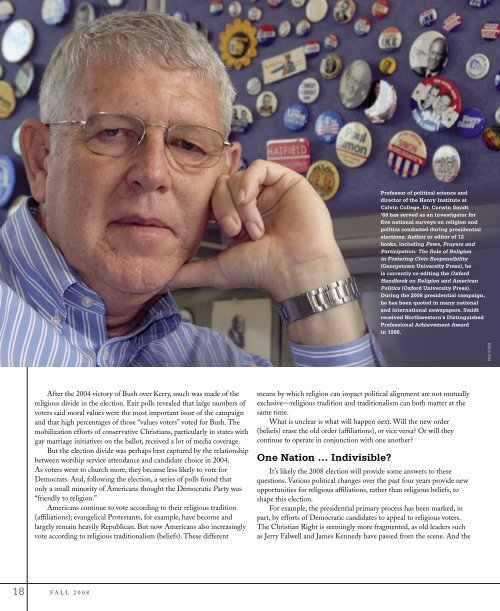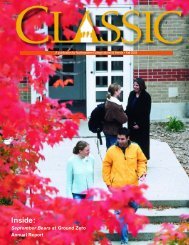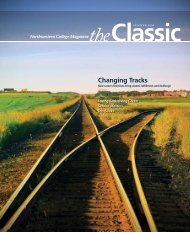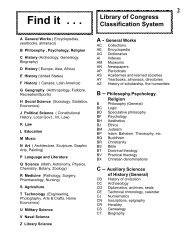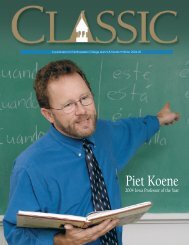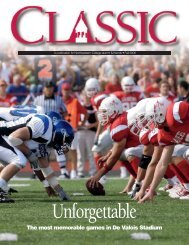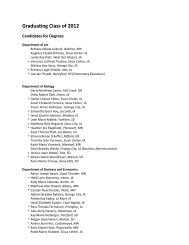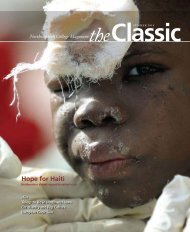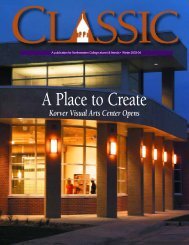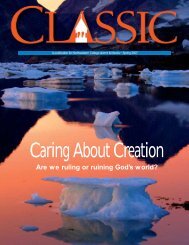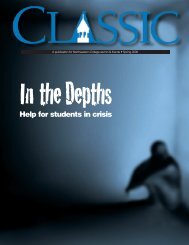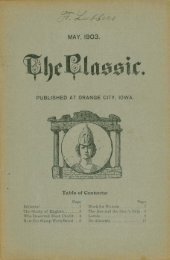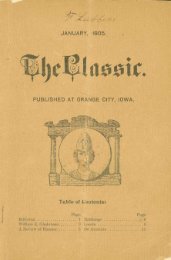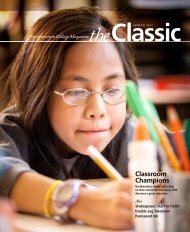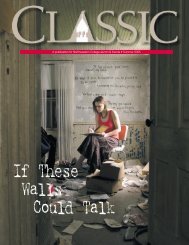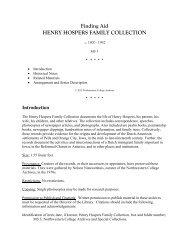fall 2008 - Northwestern College
fall 2008 - Northwestern College
fall 2008 - Northwestern College
Create successful ePaper yourself
Turn your PDF publications into a flip-book with our unique Google optimized e-Paper software.
Professor of political science and<br />
director of the Henry Institute at<br />
Calvin <strong>College</strong>, Dr. Corwin Smidt<br />
’68 has served as an investigator for<br />
five national surveys on religion and<br />
politics conducted during presidential<br />
elections. Author or editor of 12<br />
books, including Pews, Prayers and<br />
Participation: The Role of Religion<br />
in Fostering Civic Responsibility<br />
(Georgetown University Press), he<br />
is currently co-editing the Oxford<br />
Handbook on Religion and American<br />
Politics (Oxford University Press).<br />
During the <strong>2008</strong> presidential campaign,<br />
he has been quoted in many national<br />
and international newspapers. Smidt<br />
received <strong>Northwestern</strong>’s Distinguished<br />
Professional Achievement Award<br />
in 1996.<br />
pAUL STOUB<br />
After the 2004 victory of Bush over Kerry, much was made of the<br />
religious divide in the election. Exit polls revealed that large numbers of<br />
voters said moral values were the most important issue of the campaign<br />
and that high percentages of those “values voters” voted for Bush. The<br />
mobilization efforts of conservative Christians, particularly in states with<br />
gay marriage initiatives on the ballot, received a lot of media coverage.<br />
But the election divide was perhaps best captured by the relationship<br />
between worship service attendance and candidate choice in 2004.<br />
As voters went to church more, they became less likely to vote for<br />
Democrats. And, following the election, a series of polls found that<br />
only a small minority of Americans thought the Democratic Party was<br />
“friendly to religion.”<br />
Americans continue to vote according to their religious tradition<br />
(affiliations); evangelical Protestants, for example, have become and<br />
largely remain heavily Republican. But now Americans also increasingly<br />
vote according to religious traditionalism (beliefs). These different<br />
means by which religion can impact political alignment are not mutually<br />
exclusive—religious tradition and traditionalism can both matter at the<br />
same time.<br />
What is unclear is what will happen next. Will the new order<br />
(beliefs) erase the old order (affiliations), or vice versa? Or will they<br />
continue to operate in conjunction with one another?<br />
One Nation … Indivisible?<br />
It’s likely the <strong>2008</strong> election will provide some answers to these<br />
questions. Various political changes over the past four years provide new<br />
opportunities for religious affiliations, rather than religious beliefs, to<br />
shape this election.<br />
For example, the presidential primary process has been marked, in<br />
part, by efforts of Democratic candidates to appeal to religious voters.<br />
The Christian Right is seemingly more fragmented, as old leaders such<br />
as Jerry Falwell and James Kennedy have passed from the scene. And the<br />
18<br />
FALL <strong>2008</strong>


